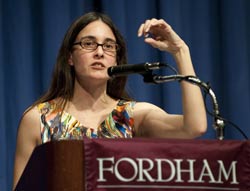
Donna Freitas, Ph.D., is calling on Catholic college leaders to better address their students’ need for a religious response to their sexual questions..
Photo by by Leo Sorel
If Catholic students want to break free of the “hook-up culture” that is rampant on American college campuses, they can look to Catholic spiritual practices and social teaching, Donna Freitas, Ph.D., told a packed auditorium on the Lincoln Center campus.
Freitas, a visiting assistant professor of religion at Boston University, delivered her remarks at “Sex and the Soul: Romance, Religion and Responsibility,” a forum sponsored by the Fordham Center on Religion and Culture.
In Sex and the Soul: Juggling Sexuality, Spirituality, Romance and Religion on America’s College Campuses (Oxford University Press, 2008), Freitas detailed the results of extensive interviews with students at evangelical and Catholic colleges.
Her research showed that students at these religious colleges are trapped between a culture that celebrates the separation of sex from intimacy and a longing for spirituality that goes unaddressed by school leaders. The way to close this gap is to highlight Catholic spiritual practices, such as discernment.
“We often hear about people discerning a vocation. So I ask students to discern a hook-up partner on Friday night,” she said at the Oct. 28 event. “Generally, discernment involves a lot of conversation. Some of that conversation, in the context of a religious tradition, is with God, and also with people who know you well.”
Christine Firer Hinze, Ph.D., professor of theology at Fordham, praised Freitas for highlighting the disconnect between what is taught to students about sexuality and what is actually happening on campuses.
“Spiritual schools need to cultivate diverse resources and mentor rich, intellectually attractive and emotionally safe contexts where young adults can converse and reflect on their spiritual and sexual journeys,” she said. “When these are lacking during the college years, some pretty important parts of the whole person remain neglected, and one’s higher education—to that degree—is stunted.”
Hinze also touted Catholicism as having a treasure trove of alternatives to the sexual and spiritual emptiness of the hook-up.
“To moral teaching and reflection, we can add heavy hitters like Ignatian spirituality, liberation and feminist theologies, and Catholic sacramental sensibilities and practices and piety,” she said. “These resources can appeal to traditional Catholics; to young people wary of institutional practice but receptive to the ideas about sex and love that a humanistic Christian vision holds; and even to sexually active seekers regardless of religious background who intuit in their sexual and spiritual experiences deeper meanings and larger connections.”
Kate DiGeronimo (FCLC ’07), a Fordham Law student and senior resident assistant at McMahon Hall, said she most enjoyed Sex and the Soul’s message that religion can be a positive force for change.
“Liberation theologians are focused on using Christianity to improve the position of those marginalized in our society, and I believe that same tradition of challenging prevailing social attitudes can be a powerful check on hook-up culture,” she said.
Barbara Dafoe Whitehead, Ph.D., former co-director of the National Marriage Project at Rutgers and author of Why There Are No Good Men Left: The Romantic Plight of New Single Women (Broadway, 2002), noted that the “Odyssey Years”—when people in their 20s wander romantically and physically—is a very recent phenomenon.
“Much of what college students know about sex, love, commitment and marriage is a hodgepodge of pop culture, therapy, stuff they read on the Internet and social science factoids. I agree that theology can provide a much richer understanding of the connections among all these experiences,” she said.
Freitas said the song “Campus” by Vampire Weekend sums up students’ dilemma with the line: “How am I supposed to pretend that I never want to see you again?”
Men and women alike are expected to use sex to meet a prospective partner, and in the process turn off any real feelings of intimacy, she said. Alcohol and a culture saturated with pornography share blame, but religion has failed, too.
“We aren’t used to putting spiritual tools to work in the context of sexual decision-making,” she said. “But once we start expanding our sense of resources, to respond to both our students’ anxiety about the hook-up culture and their hope that spirituality might have something to offer on this front, the possibilities are exciting.”
